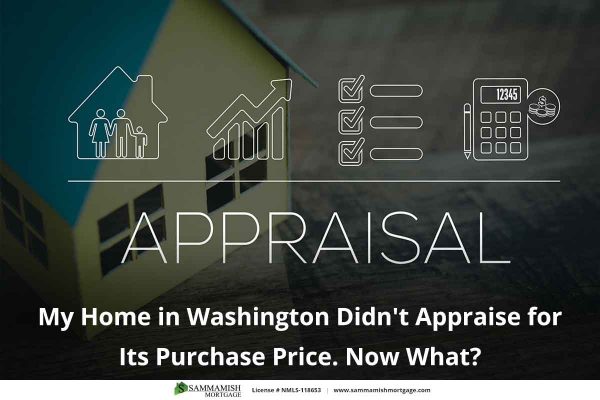No Obligation and transparency 24/7. Instantly compare live rates and costs from our network of lenders across the country. Real-time accurate rates and closing costs for a variety of loan programs custom to your specific situation.

When you apply for a loan to buy or refinance a home, the lender will get an appraisal to document its value. If you’re purchasing the home, we’ll use the lesser of the agreed purchase price or the appraised value. If the appraiser’s opinion of value is the same as or greater than the value we are assuming and hoping for, everything is fine. If the value is lower than expected, may have a problem.
Let’s see how serious the problem might be.
It would be helpful first to know how appraisers arrive at their “opinion of value.” Although we may have strong reactions to some opinions held by others, an appraiser’s opinion is one we can literally take to the bank.
The appraiser’s opinion of value is anything but arbitrary. He (or she) goes through a standardized, systematic process to generate a comprehensive report containing the value the lender will use in its lending decision.
The property in question is called the “Subject Property,” or simply “Subject.” The appraiser starts by describing it in a systematic, standardized way. She’ll measure it to determine the home’s gross living area. This does not include a functional garage or, typically, outbuildings like sheds. She’ll make a diagram of the property’s layout from those measurements.
She’ll count the rooms, make note of the amenities, such as pool and spa, built-in appliances, central heat and air, solar panels, etc. She’ll make some informed judgments about “condition” and “upgrades” if the property is old enough to have been remodeled in any significant way. She’ll take pictures of all the rooms, the back yard, front yard, street view to show the neighborhood and any other photos that will help describe the property.
Next, she’ll find at least three similar properties near the Subject that have sold recently, typically within six months. These are called “Comparable Sales,” or simply “Comps.” She’ll get the information from public records and the local Multiple Listing Service. She’ll take exterior photos of the comps she has chosen.
She will list each one of the Comps in her report, including the date they sold and the price they sold for. She will apply adjustments to each of the Comps to make them the equivalent of the Subject. If one of the Comps was nearly identical to the Subject but was 100 square feet smaller, the appraiser would adjust the selling price upward based on a cost-per-square-foot factor appropriate for the area.
For a mid-priced home, a cost of $50-$60 per square feet is common. Using the lower of the two factors, she would add $5,000 to the selling price of the Comp. If it had sold for $500,000, its adjusted sales price would be $505,000 because of the smaller living area.
The appraiser will apply similar adjustments for characteristics such as room count, number of bathrooms, size of the garage, lot size, and whether or not there is a swimming pool.
There are other adjustments that rely more on the appraiser’s judgment. Among these items are things like whether there is a view, whether there is noise from a nearby freeway, whether the condition is superior or inferior to the Subject. Each one of these characteristics will result in an adjustment—up or down—to the Comp’s price.
When the appraiser has done all this groundwork, she’ll list the comparable sales in what appraisers call the “Comp grid.” She’ll put the Comp that is most similar to the Subject first in the grid, and less similar Comps will come after. She’ll calculate a weighted average of the adjusted selling prices to arrive at her official Opinion of Value as of a certain date.
It’s important to know that only sales that have actually closed affect the price the appraiser comes up with. Properties that currently on the market may be listed but only to show the general conditions in the market.
Finally, the appraiser will write a narrative report explaining the methods by which she arrived at her Opinion of Value. She may summarize why she selected certain Comps, and why she made the adjustments she did.
Think of all the above as a sort of crash course in appraising. Having that information can be useful if you (and your loan officer) find yourselves in the position of having to challenge an appraisal that came in with too low a value.
It is no longer possible to discard an appraisal we don’t like and simply order another. Appraisals are now entered into the Uniform Appraisal Dataset, which means that most appraisal data are stored centrally to prevent “appraisal shopping.”
If an appraiser delivers a report we judge as showing an incorrect value, we can dispute it—we can request a “Reconsideration of Value.” To do this, your loan officer would supply data to the appraisal management company that the original appraiser might have missed or misinterpreted. Did the appraiser ignore a comparable sale that would have supported a higher value? Did they fail to adjust one of the Comps in a way that would have supported a higher value?
Sometimes this kind of appeal works. Appraisers are human, after all, and can make mistakes. Most times, the appraiser stands by her report—and the value. Still, it doesn’t hurt to make the attempt.
Let’s say we are in contract to buy a home for $450,000. We plan to make a 20% down payment and get a loan for $360,000. We have our loan pre-approval and are just waiting for the appraisal. So far, so good.
The appraiser’s Opinion of Value is (drum roll…) $440,000 (Sad trombone), $10,000 less than our purchase price.
The loan will be determined by the lesser of the agreed purchase price or the appraised value. So our 80% loan is now $352,000.
We have some choices. If the purchase contract has an “appraisal contingency,” we can try to renegotiate the purchase price with the seller. A seller might agree to drop their price in a case like this because they know you could walk away from the deal. If they agree to lower their price to $440,000, you’ll still make the 20% down payment you had planned on, but at a lower price.
If the seller is adamant about not lowering their price and you still want to proceed at the original price, you can put a little more cash down to make up the difference between the loan and the purchase price. You’d need an additional $8,000.
The other possibility is to continue as you had originally planned. You can get the $360,000 loan as before, but since the lender uses a value of $440,000, your loan will be more than 80% of the value—81.8% to be exact. This means you’ll pay mortgage insurance for a period of time.
The cost of mortgage insurance—you may have heard the term “PMI”—depends on the loan to value ratio and on your credit score. It could cost as little as $57.00 per month. Once you can document that the property’s appraised value is high enough that your loan is 80% or less, you’ll be able to drop the monthly PMI. You should check with your lender to be sure of their specific process for doing this.
Buying or refinancing a home can be a stressful experience, especially when things don’t go precisely as planned. But if the appraised value leaves something to be desired, now you know that you have some choices.
Do you have questions about mortgages? We have the answers. Sammamish Mortgage is a local, family-owned company based in Bellevue, Washington. We serve the entire state, as well as Oregon, Idaho, and Colorado. We offer several mortgage programs, and have been doing so since 1992. Please contact us if you have mortgage-related questions.


Whether you’re buying a home or ready to refinance, our professionals can help.
{hours_open} - {hours_closed} Pacific
No Obligation and transparency 24/7. Instantly compare live rates and costs from our network of lenders across the country. Real-time accurate rates and closing costs for a variety of loan programs custom to your specific situation.